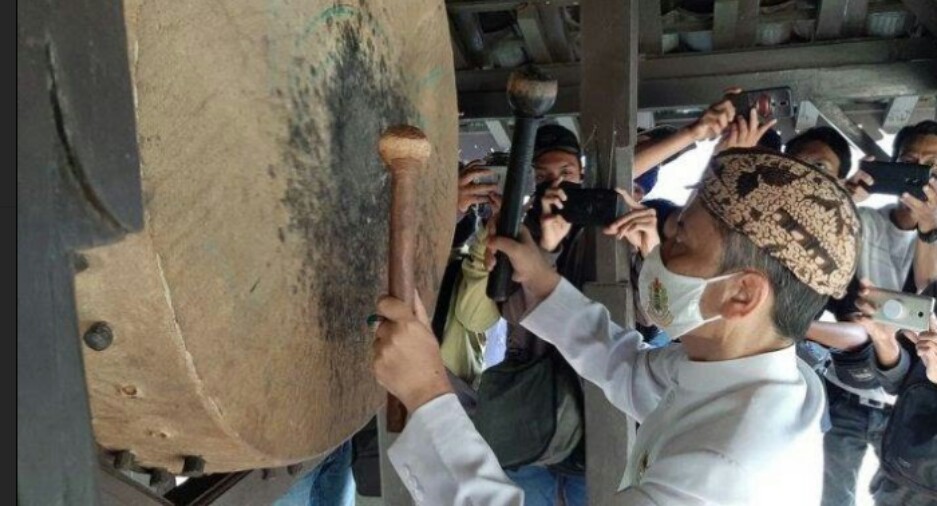Tradition During Ramadan at Cirebon Kasepuhan Palace

Cirebon, MINA – The tradition of welcoming the holy month of Ramadan at the Kasepuhan Palace, Cirebon, is back to life. During the two years hit by the Covid-19 pandemic, various traditions in the palace had to be carried out on a limited basis and some were even abolished.
The tradition of welcoming Ramadan begins with dlugdag. Namely, the beating of hundreds of years old drum at Langgar Agung Kasepuhan Palace as a marker for the entry of the holy month of Ramadan.
The Kasepuhan Palace follows government regulations in determining the timing of the arrival of the holy month of Ramadan. Therefore, after the government announced that Ramadan would start on Sunday, the dlugdag tradition was held on Saturday afternoon, after Asr prayer.
The drumming was started by the Patih Sepuh of the Kasepuhan Palace, Prince Raja Gumelar Suryadiningrat, for a few minutes. After Patih Sepuh, the beating of the drum was continued by the head of the Sang Cipta Rasa Kasepuhan Grand Mosque, KH Jumhur and a number of palace relatives.
The drum that is played in the dlugdag tradition has existed since the time of Sunan Gunung Jati. The drumming begins with the reading of Basmallah, remembrance and prayer. Likewise during the beating of the drum it took place.
“Alhamdulillah, we thank Allah SWT, we are entering the holy month of Ramadan,” said Patih Sepuh as quoted from Republika co id on Sunday.
Patih Sepuh explained dlugdag continues to be preserved in the Kasepuhan Palace as a tradition to welcome the holy month of Ramadan. It means, as a Muslim, you have to welcome the coming month full of blessings and forgiveness.
Apart from dlugdag, continued Patih Sepuh, the tradition carried out at the Kasepuhan Palace during Ramadan also includes tadarusan. The activity of reading the Koran is carried out every night after the tarawih prayer is finished.
So far, tadarusan activities will complete the Quran within 15 nights. Thus, during the month of Ramadan, khataman is performed twice.
“And on the night of Likuran (the last ten nights of Ramadan), there is a maleman tradition,” said the younger brother of the late Sultan Sepuh XIV, PRA Arief Natadiningrat.
The maleman tradition is marked by lighting dlepak and burning ukup every night on the odd date of Bakda Maghrib. Dlepak is a plate made of pottery and filled with maleman oil to light the wick of the twisted cotton.
Maleman oil is made from coconut oil which is boiled again with the addition of seven kinds of flowers. Therefore, the oil will give off a very fragrant aroma when the wick is lit.
While ukup is a fragrance made from a mixture of sandalwood trees, vetiver, fragrant woods, spices, which are chopped and roasted with brown sugar. To burn it, just enough to spread it over the coals that are lit in incense.
The device was then transported by car from the Kasepuhan Palace to Astana Gunung Jati. The dlepak will be lit every odd night in the last ten nights of Ramadan.
“The point is to welcome the night of lailatul qodar,” said Patih Sepuh.
Patih Sepuh revealed, for the past two years, his party has complied with government recommendations regarding the implementation of health protocols to prevent the spread of Covid-19. Therefore, various traditions are carried out in a limited manner and some are even abolished so as not to cause a crowd.
“God willing, this year we will carry out the traditions that at that time (the pandemic) we did not carry out,” said Patih Sepuh.
In addition to traditions throughout Ramadan, the Kasepuhan Palace also has various traditions on Eid al-Fitr. In addition to Eid prayers at the Great Mosque of Sang Cipta Rasa and Langgar Agung, there is also the playing of sekaten gamelan and an open house. In 2020, these Eid traditions will be abolished following the implementation of large-scale social restrictions (PSBB) in Cirebon City. (T/RE1)
Mi’raj News Agency (MINA)






